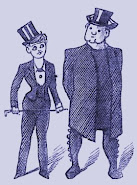
Many penny bloods were supposed to have been pirated by unscrupulous publishers in the United States, but that was not always the case. In Reynolds's Newspaper for 15 Jun 1851 there is a short article titled 'Testimonial from America to G. W. M. Reynolds' in which a letter "accompanied by a ring of massive value and exquisite workmanship" was received by the author. H. Long may even have been supplied the original Henry Anelay woodblock illustrations >
Testimonial from America to G. W. M. Reynolds.
The following letter, accompanied by a ring of massive value and of exquisite workmanship, was recieved by Mr. Reynolds on Monday last. The bearer was Mr. Wilkes, an American gentleman. The ring is engraved with a representation of the Phrygian cap, encircled by the motto of "Liberty, Fraternity, and Equality;" and inside the hoop is this enscription:- "George W. M. Reynolds, from H. Long and Brothers, May 1851." The highly flattering letter which accompanied this handsome gift, is concieved in the following terms:-
New York, May 15th, 1851.
G. W. M. Reynolds, Esq., London.
"Dear sir, -- Permit us, the publishers of your works in the United States, as a slight token of our admiration and respect for your splendid genius as an author and your liberal sentiments as a man, to present to you the accompanying ring. It is formed of the virgin gold of California -- the new State -- the last star which has been added to our glorious galaxy of free republics, and will not go inappropriately to one who has laboured so earnestly for democracy in the Old World, and expended thhe wealth of genius so profusely in the cause of human rights.
"We of America, hold that his liberal sentiments have consecrated the name of Byron, with a glory his aristocratic rank, or even his splendid poetical genius could never have attained; and when the works of G. W. M. Reynolds shall be shrined hereafter, as they must be, in the library of Historicall Romances, even the beauties of style, the elegance of diction, the correctness of detail, and all perfections of his composition will be secondary in the estimation of posterity to his just, liberal, and humane democracy which will shine resplendent above all:
"Accept then, sir, this slight token of regard from your American publishers, who only regret they are not able to offer the evidence of their high appreciation of your works in a more solid form.
"With sincere admiration and esteem,
"Your friends and obt. servants,
"H. Long and Brothers."












No comments:
Post a Comment